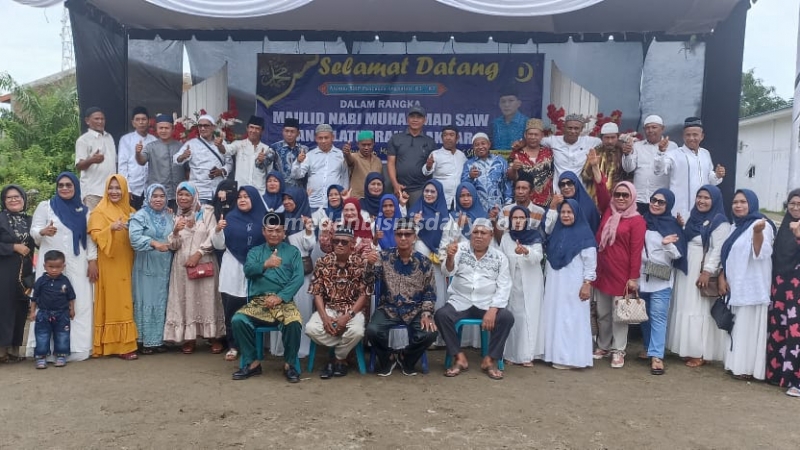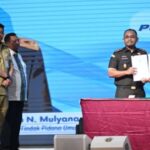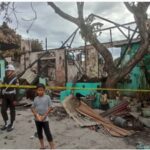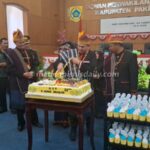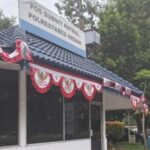Alumni of the private junior high school SMP Pancasila Foundation in Tanjung Beringin district, Serdang Bedagai regency, held a grand reunion and gathering while commemorating the Mawlid (Birth) of Prophet Muhammad.
The event, initiated by the 1985 alumni class, took place at the Public Hall courtyard on Jati Street in Tanjung Beringin, right in front of the Pancasila Education Foundation building.
This reunion brought together alumni from the 1985 to 1987 classes in an atmosphere filled with warmth and nostalgia.
The committee chairperson stated in his address that this event is a continuation of last year’s reunion which has now been expanded to include several graduating classes.
“The main purpose of this reunion is to strengthen the bonds of friendship among alumni who left school 40 years ago. Even though many of us are now grandparents, the spirit of togetherness remains alive,” he said.
He also emphasized the importance of the discipline values instilled by teachers during school years.
“Back then we might have considered the rules to be strict, but now we realize that discipline reflects our individual lives,” he added.
Meanwhile, the principal of SMP Pancasila expressed appreciation for the successful organization of the event. He mentioned that in the 1980s, SMP Pancasila was known as a progressive school with various extracurricular activities such as scouting, marching band, and sports.
“We thank the alumni for their support. Currently, the number of students at SMP and MTs Pancasila has reached more than 400. We hope this school continues to exist and produces resilient generations with noble character,” he said.
One of the first-generation alumni recalled the school’s establishment in 1978.
He recounted that the first building of SMP Pancasila was very simple, but the students’ learning spirit at that time was extraordinary.
“Even though the building was basic, many alumni have now succeeded in various fields, from civil servants, military, police, to village heads,” he shared.
The reunion event also featured a Mawlid sermon about Prophet Muhammad, delivered by an alumni from the 1986 class.
In his lecture, he reminded everyone of the importance of maintaining good relations as part of the Prophet’s teachings.
“Through this event, we are reconnecting bonds of friendship that may have been broken for over 35 years. This is a real manifestation of the teachings of Prophet Muhammad,” he stated.
The event concluded with a joint prayer and social gathering among alumni. Participants expressed hope that this grand reunion would become a momentum to strengthen brotherhood and encourage the progress of SMP Pancasila in the future.
SMP Pancasila
SMP Pancasila is an Indonesian junior high school whose name is derived from Pancasila, the official philosophical foundation of the Indonesian state. The school’s identity is intrinsically linked to the national ideology, which was formulated in 1945 to unite the diverse archipelago under a set of common principles. As an educational institution, its purpose is to instill these values of belief in one God, just and civilized humanity, Indonesian unity, democratic citizenship, and social justice in its students.
Tanjung Beringin district
I am unable to provide a summary for Tanjung Beringin district as I do not have specific historical or cultural information about this location in my knowledge base. It may be a local district in Indonesia, but I cannot confirm its specific significance or background. For accurate information, I would recommend consulting a local tourism board or regional historical source.
Serdang Bedagai regency
Serdang Bedagai is a regency located on the east coast of North Sumatra, Indonesia, established in 2003 from the division of the former Deli Serdang Regency. Historically, the area was part of the Serdang and Bedagai Sultanates, which were influential Malay kingdoms in the region. Today, its economy is primarily based on agriculture, particularly palm oil and rubber plantations, and it features coastal areas like Pantai Cermin.
Public Hall
Public Hall, also known as Old Stone Church, is a historic meeting house built in 1834 in Cleveland, Ohio. It served as a central gathering place for religious services, community events, and abolitionist meetings in the 19th century. Today, it remains an active Presbyterian church and a landmark of Cleveland’s early history.
Jati Street
I am unable to provide a specific summary for “Jati Street” as it is a common street name found in several countries, particularly in Indonesia and Bangladesh, without a single, globally recognized historical or cultural significance. To give an accurate summary, more specific context, such as the city or country, would be needed. For example, Jati Street in a particular city might be known for its local market, colonial architecture, or as a historic commercial area.
Pancasila Education Foundation
The Pancasila Education Foundation is an Indonesian organization established to promote and teach Pancasila, the official philosophical foundation of the Indonesian state. It was created to ensure the continued understanding and application of Pancasila’s five principles across society, particularly following periods of political change. The foundation’s work focuses on civic education to foster national unity and democratic values based on this core ideology.
Prophet Muhammad
Prophet Muhammad is the founder of Islam and is considered by Muslims to be the last prophet of God. He was born in Mecca in the 6th century and received the first revelations of the Quran at age 40, establishing a new monotheistic faith. His migration (Hijra) from Mecca to Medina in 622 CE marks the beginning of the Islamic calendar.
Mawlid
“Mawlid” refers to the observance of the birthday of the Islamic prophet Muhammad, which is celebrated in the third month of the Islamic lunar calendar. The practice is believed to have originated in the 8th century by the Fatimid dynasty as a way to honor the Prophet’s life and teachings. While it is a significant cultural and religious event marked by festivities in many Muslim communities, its observance varies and is sometimes a point of theological discussion.

